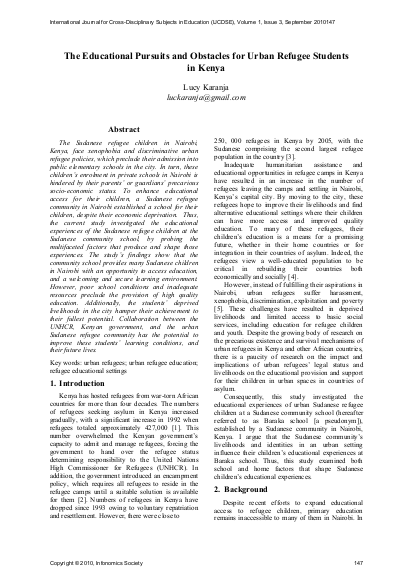
The Sudanese refugee children in Nairobi, Kenya, face xenophobia and discriminative urban refugee policies, which preclude their admission into public elementary schools in the city. In turn, these children’s enrolment in private schools in Nairobi is hindered by their parents’ or guardians’ precarious socio-economic status. To enhance educational access for their children, a Sudanese refugee community in Nairobi established a school for their children, despite their economic deprivation. Thus, the current study investigated the educational experiences of the Sudanese refugee children at the Sudanese community school, by probing the multifaceted factors that produce and shape those experiences.
The study’s findings show that the community school provides many Sudanese children in Nairobi with an opportunity to access education, and a welcoming and secure learning environment. However, poor school conditions and inadequate resources preclude the provision of high quality education. Additionally, the students’ deprived livelihoods in the city hamper their achievement to their fullest potential. Collaboration between the UNHCR, Kenyan government, and the urban Sudanese refugee community has the potential to improve these students’ learning conditions, and their future lives.
Resource collections
- Sudan humanitarian response
- UN Habitat - Urban Response Collection
- Urban Response - Urban Crisis Preparedness and Risk Reduction
- Urban Response Collection - Community Engagement and Social Cohesion
- Urban Response Collection - Economic Recovery
- Urban Response Collection - Environment and Climate Change
- Urban Response Collection - Housing, Land and Property
- Urban Response Collection - Urban Crisis Response, Recovery and Reconstruction
- Urban Response Collection - Urban Resilience